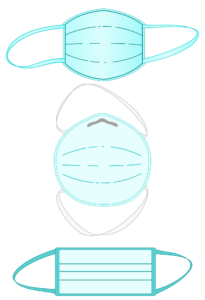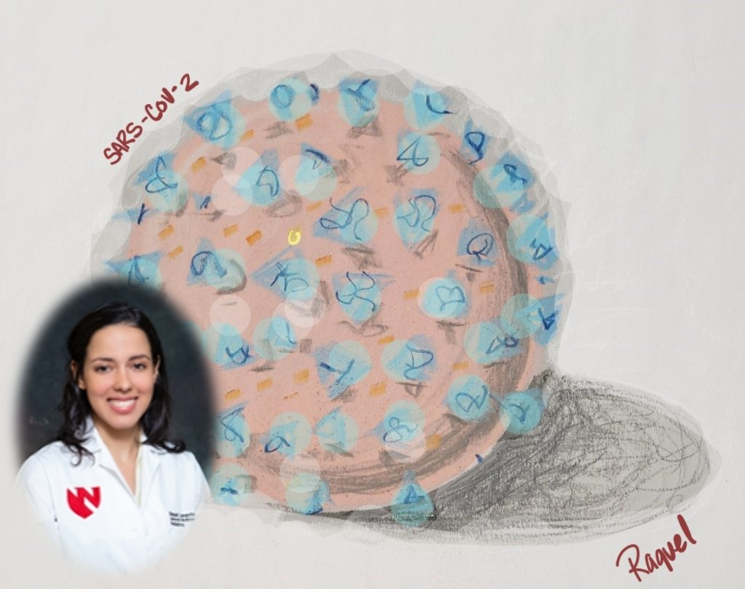As our institution, state, country, and the world grapple with the impacts of SARS-CoV-2, causing COVID-19, there are lots of ongoing discussions about coronaviruses. Dr. Raquel Lamarche is a PGY1 Internal Medicine/Pediatrics resident at UNMC, who will be summarizing updates about SARS-CoV-2 and hopefully make information easier to digest, with additional outlines of implications for graduate medical education. You can follow Dr. Lamarche on Twitter @LamarcheRaquel. This week Dr. Lamarche discusses “Innovation in the time of COVID-19: No idea is too small“.
I am a physician. The engine of my mind naturally shapes itself around problems, imagines its most likely origins, crafts hypotheses, and engineers experiments/plans. Sometimes I think to myself, “Raquel, make a decision, and please look confident.” Despite all the evidence gaps in medicine, a physician is trained to act like they know what they are doing; as if their intuition was conclusive. But the desire to always be right and prove ourselves through medicine could obscure great ideas.
 A crisis awakens a collective sense of alertness, triggering us to appreciate each other’s stories and the contributions we make through them. We value life more than ever, and act to assuage fears and combat misinformation. We need bold people, who are not afraid of being imperfect who are willing to put their ideas to the test…because no idea is too small during these times.
A crisis awakens a collective sense of alertness, triggering us to appreciate each other’s stories and the contributions we make through them. We value life more than ever, and act to assuage fears and combat misinformation. We need bold people, who are not afraid of being imperfect who are willing to put their ideas to the test…because no idea is too small during these times.
The COVID-19 pandemic’s effect on the healthcare system has catalyzed a myriad of innovations. Prominent themes include: promotion of patient access with telehealth visits, disease screening with the use of apps, testing innovations (for instance, drive thru-testing, or creating the fastest test!), strategies to overcome the shortage of Personal Protective Equipment (PPE), and creative design of supplies/devices (e.g., face masks, ventilators). See below a summary with some of these innovations. Note: this is neither an exclusive nor exhaustive list; there are so many cool innovations out there, so feel free to comment on this post or connect with us on Twitter at @UNMC_ID to share more!
COVID19 SCREENING APPLICATIONS. University of Nebraska Medical Center (UNMC) created an app available for Apple users, 1-Check COVID, to help screen large populations for COVID. The user answers a series of questions, the app issues an assessment “low-risk,” “urgent risk,” or “emergent risk,” and guides the possible next steps. UK College also developed their own screening app, and Stanford university designed an app that helps first responders (police-officers, firefighters, paramedics) screen their symptoms, and, if needed, get high priority testing.
 SARS-CoV-2 TESTING. The fastest molecular point of care test for COVID-19 is the Abbott ID NOW™ COVID-19, with positive results in five minutes, and negative results in 13 minutes. Abbott plans to produce 50,000 tests per day, and 5 million tests per month. Another rapid point of care test is the lateral flow immunoassay; it detects IgM and IgG antibodies against SARS-CoV-2 within 15 minutes. The University of Minnesota and Mayo Clinic also developed a SARS-CoV-2 antibody test. While scientists are still working out the kinks of the ideal COVID-19 test, the competition and race to innovation will ultimately give way to development of the test we need.
SARS-CoV-2 TESTING. The fastest molecular point of care test for COVID-19 is the Abbott ID NOW™ COVID-19, with positive results in five minutes, and negative results in 13 minutes. Abbott plans to produce 50,000 tests per day, and 5 million tests per month. Another rapid point of care test is the lateral flow immunoassay; it detects IgM and IgG antibodies against SARS-CoV-2 within 15 minutes. The University of Minnesota and Mayo Clinic also developed a SARS-CoV-2 antibody test. While scientists are still working out the kinks of the ideal COVID-19 test, the competition and race to innovation will ultimately give way to development of the test we need.
THE DIGITAL FORCE. The power of digital technology has also scaled up our traditional health care system with the sudden ability to do telehealth. “Clinical workflows and economic incentives have largely been developed to support and reinforce a face-to-face model of care, resulting in the congregation of patients in emergency departments and waiting areas during this crisis. This care structure contributes to the spread of the virus to uninfected patients who are seeking evaluation.” – Sirina Keesara, M.D
 PERSONAL PROTECTIVE EQUIPMENT INNOVATION. Medical University of South Carolina crafted a modular HEPA filtration system that can be fitted onto hospital masks. For those that are into doing it yourself, you can find innovative ideas on YouTube covering how to make an elastomeric respirator, or how to create an improvised droplet barrier to minimize the use of PPE. There is also the possibility for extended use and re-use of N95 respirators! Or to inactivate the virus by applying Ultraviolet germicidal irradiation (UVGI) to used N95s. A protective barrier developed at UNMC shields and protects health care workers from contagions and other contaminants during intubation procedures.
PERSONAL PROTECTIVE EQUIPMENT INNOVATION. Medical University of South Carolina crafted a modular HEPA filtration system that can be fitted onto hospital masks. For those that are into doing it yourself, you can find innovative ideas on YouTube covering how to make an elastomeric respirator, or how to create an improvised droplet barrier to minimize the use of PPE. There is also the possibility for extended use and re-use of N95 respirators! Or to inactivate the virus by applying Ultraviolet germicidal irradiation (UVGI) to used N95s. A protective barrier developed at UNMC shields and protects health care workers from contagions and other contaminants during intubation procedures.
MISCELLANEOUS INNOVATIONS
• A wristband can track affected individuals, and trace their contacts. In the scenario of a future epidemic, the wristband could play a role in selectively quarantining the affected cases and the people that have been in contact with them. South Korea used smartphones to tag the movement of cases and alert the non-infected via real-time updates; this drove rapid testing of over 200,000 of its citizens.
• João Nascimento, a Portuguese Neurosciences and Philosophy student at Harvard University, launched an appeal to crowdsource ideas to produce more ventilators. The project developed a proof of concept of a minimalist pressure-controlled emergency ventilator.
• Christian Fracassi and Alessandro Romano, two young Italian engineers specialized in 3D printing, in collaboration with Dr. Renato Favero, constructed an emergency respiratory mask for assisted ventilation,, by adjusting a snorkeling mask already available on the market.
• Artificial intelligence-powered drones, carry UV-C lights to disinfect rooms.
• Remote temperature monitoring patch.
• Expedited production with 3D printers.
• COVID-19 Lung Ultrasound simulation module.
• LED Bracelet that reminds you to wash your hands properly.
 I CHALLENGE YOU. We need your ideas and innovative solutions to address this pandemic. Roche Canada, University of Chicago, Amazon, and others have all launched innovation challenges in the hopes of advancing in the fight against SARS-CoV-2.
I CHALLENGE YOU. We need your ideas and innovative solutions to address this pandemic. Roche Canada, University of Chicago, Amazon, and others have all launched innovation challenges in the hopes of advancing in the fight against SARS-CoV-2.
This pandemic has been disastrous to thousands of individuals and families. Some of the innovations developed during this crisis will transform the way we practice medicine, and others may not make it past the idea stage. But there is a little bit of joy in watching humanity re-think their ways, collaborating, and innovating. When someone shares a well-thought out idea we should notice it, and encourage it, as creativity is very contagious.
